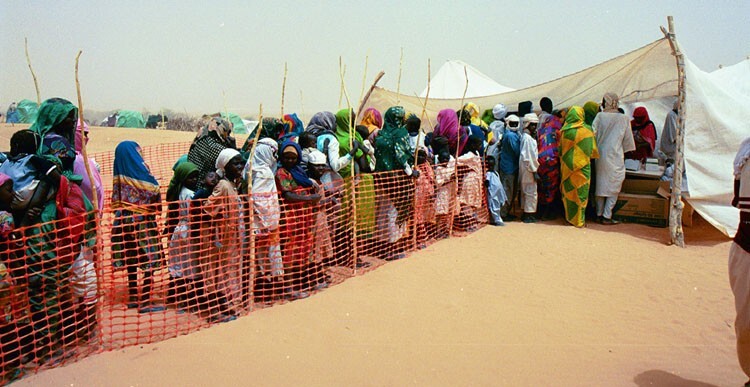Opinion: Sudan war poses security, humanitarian, political, and economic challenges for Chad

A Sudanese refugee camp in eastern Chad (file photo: social media)
PARIS –
The consequences of the conflict that erupted in Sudan on April 15, between the Sudan Armed Forces (SAF) under the command of Lt Gen Abdelfattah El Burhan, and the paramilitary Rapid Support Forces (RSF) commanded by Lt Gen Mohamed ‘Hemedti’ Dagalo, were immediately felt in eastern Chad. The countries share a 1,403 kilometres border and continuation of the fighting could destabilise the Chad further. Tens of thousands of refugees are threatened by the imminent rainy season.
Mahamat Déby, President of Chad and an ethnic Zaghawa*, reportedly fears a victory of the RSF, a militia consisting of paramilitaries mostly recruited from Arab nomad tribes in the region.
“Many Chadians want an end to the Zaghawa rule, which has lasted for more than 30 years. In case Hemedti [the RSF] wins, Chadian Arab forces could be a real threat to [Chadian President Mahamat] Déby, as they can feel encouraged to try to take power in the country,” political scientist Helga Dickow wrote on Thursday.
“In case of his defeat however, Dagalo would not give up his stronghold. The gold of Darfur is the reason for his wealth and military strength,” she added.
RSF Commander Hemedti is well connected within Chadian politics. He is of Chadian Arab descent and has a stronghold in Darfur. His cousin Bichara Djadallah is the personal chief of staff of President Déby.
Economically, Chad is heavily dependent on imports of most goods. The two main ports that supply the country are Douala in Cameroon and Port Sudan in Red Sea state.
“The closure of the borders has had an immediate impact on Chadian consumers. Prices of goods and services have risen by up to 70 per cent,” Nairametrics reported in May.
Chadian neutrality
Not long after the outbreak of the violence on Saturday April 15, Chad closed its border with Sudan. It later announced that it had received more than 320 defecting Sudanese military soldiers who fled the violence inside its territory.
N’Djamena reported that a number of army soldiers fled to Chad after the SAF-RSF war started in mid-April. They crossed the border and surrendered to the Chadian army.
Chadian Defence Minister Daoud Ibrahim said that the soldiers have all been disarmed and sheltered.
He added that “those who surrendered to our forces are 320 members of the Sudanese Armed Forces, from the gendarmerie, police, and army. They fled fearing they would be killed by the RSF.”
“The situation in Sudan is worrying and deplorable, we have taken all the necessary measures in the face of this crisis,” the minister said.
In the press statement at the time, the defence minister stressed that this war “does not concern” Chad. “It is between the Sudanese, and we must remain vigilant against all eventualities.”
In January, President Déby received both SAF Commander Lt Gen Abdelfattah El Burhan and RSF Commander Hemedti, one day after the other, in N’Djamena with the aim of ‘displaying an air of neutrality’.
Humanitarian Situation
Dickow also warned for a deterioration of the situation in eastern Chad during the upcoming rains**.
“With the rainy season approaching, access to refugees’ camps becomes almost impossible due to poor or non-existent roads,” she said. “This will make it more difficult for aid organisations to distribute relief supplies. A humanitarian disaster in eastern Chad is a possibility.”
Last year, Chad experienced unprecedented floods, affecting nearly 600,000 people. Radio Dabanga reported on May 25 that there is a possibility of heavier-than-normal rainfall in parts of Sudan.
According to the latest report published on Monday by the UN Refugee Agency (UNHCR), more than 100,000 Sudanese refugees have entered eastern Chad since the beginning of the conflict in Sudan. The number is expected to reach 200,000 in the next three months.
West Darfuri who fled to Chad told Radio Dabanga that they had to take a lot of detours and stay in hiding for days because the attackers are in control of the main roads.
Before the current influx, Chad already hosted 400,000 Sudanese refugees.
* The Zaghawa are a Sahelian ‘non-Arab’ ethnic group primarily residing in southwestern Libya, northeastern Chad, and northwestern Darfur. They speak Zaghawa, an eastern Saharan language. Zaghawa were among the first people, together with the Fur, who took up arms against the Al Bashir regime in Khartoum in early 2003.
** The rainy season in Chad typically takes place in July and August. In recent years, climate change has exacerbated the effects of the rainfall.











 and then
and then